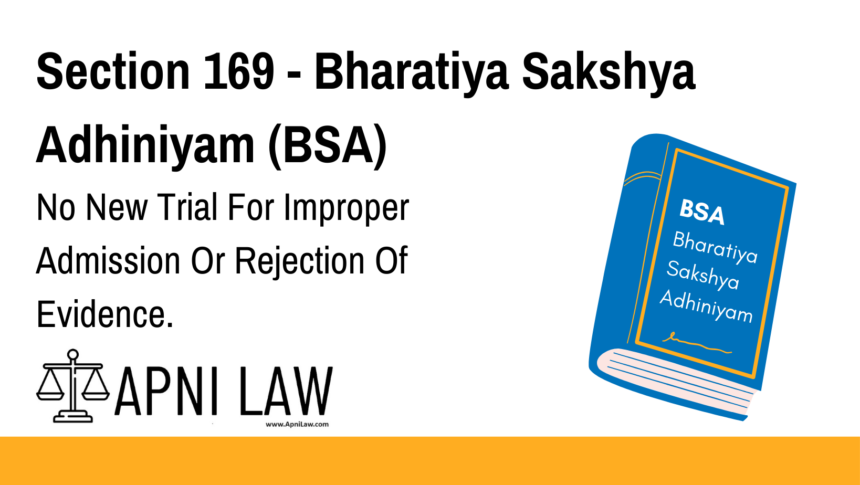Code: Section 169 BSA
The improper admission or rejection of evidence shall not be ground of itself for
a new trial or reversal of any decision in any case, if it shall appear to the Court before which
such objection is raised that, independently of the evidence objected to and admitted, there
was sufficient evidence to justify the decision, or that, if the rejected evidence had been
received, it ought not to have varied the decision.
Explanation of Section 169 BSA
Section 169 of the Bharatiya Sakshya Adhiniyam (BSA) addresses situations where there may be objections regarding the admission or rejection of evidence during a trial. The core principle of this section is that the improper admission or rejection of evidence cannot automatically lead to a new trial or a reversal of the decision, provided that the Court is satisfied with the sufficiency of the other evidence in the case.
Key Provisions:
- Improper Admission or Rejection of Evidence:
If evidence is improperly admitted (allowed) or rejected (disallowed) during a trial, this alone cannot be grounds for requesting a new trial or reversing the decision. - Sufficiency of Other Evidence:
The Court will assess whether there is enough evidence to justify the decision, even without the disputed evidence. If the remaining evidence is sufficient, the trial’s outcome remains valid. - Impact of Rejected Evidence:
If evidence was rejected during the trial, the Court will consider whether, had it been accepted, it would have influenced the decision. If the rejection of the evidence would not have changed the result, the decision stands.
Illustration
Example 1: Improper Admission of Evidence
During a trial, the judge improperly admits a piece of evidence. However, there is enough strong and relevant evidence already presented that justifies the verdict. Despite the improper admission, the decision will not be overturned.
Example 2: Rejected Evidence
In another case, a piece of evidence is rejected by the judge. If, upon review, it is found that even if the evidence had been accepted, it wouldn’t have affected the final decision, then there is no ground for a new trial or a reversal of the verdict.
Common Questions and Answers on Section 169 BSA
- Can the improper admission of evidence lead to a new trial?
- No, the improper admission of evidence does not automatically lead to a new trial unless it is shown that the admitted or rejected evidence could have changed the outcome of the case.
- What happens if the Court finds that there was sufficient evidence to support the decision?
- If the Court determines that, irrespective of the disputed evidence, the remaining evidence justifies the decision, the verdict will stand.
- Can the rejection of evidence result in the reversal of a judgment?
- Not necessarily. If the rejected evidence would not have changed the decision, the judgment remains unaffected.
- Does this section apply to all types of evidence disputes?
- Yes, this section applies to any improper admission or rejection of evidence during a trial, as long as the overall sufficiency of other evidence justifies the verdict.
Conclusion
Section 169 of the Bharatiya Sakshya Adhiniyam (BSA) helps maintain the integrity and efficiency of the judicial process. It ensures that the decision of a Court is not overturned or a new trial is not initiated based solely on the improper admission or rejection of evidence, as long as the remaining evidence supports the decision. This provision safeguards the finality of legal decisions while allowing for fair consideration of evidence.
For further legal insights or explanations of other sections, visit ApniLaw‘s detailed resources.








